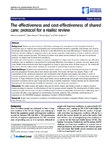The effectiveness and cost-effectiveness of shared care: protocol for realist review
| dc.contributor.author | Hardwick, Rebecca | |
| dc.contributor.author | Pearson, M | |
| dc.contributor.author | Anderson, R | |
| dc.contributor.author | Byng, R | |
| dc.contributor.editor | Byng R | |
| dc.date.accessioned | 2018-04-12T10:48:25Z | |
| dc.date.available | 2018-04-12T10:48:25Z | |
| dc.date.issued | 2013 | |
| dc.identifier.issn | 2046-4053 | |
| dc.identifier.issn | 2046-4053 | |
| dc.identifier.other | 12 | |
| dc.identifier.uri | http://hdl.handle.net/10026.1/11260 | |
| dc.description.abstract |
BACKGROUND: Shared care (an enhanced information exchange over and above routine outpatient letters) is commonly used to improve care coordination and communication between a specialist and primary care services for people with long-term conditions. Evidence of the effectiveness and cost-effectiveness of shared care is mixed. Informed decision-making for targeting shared care requires a greater understanding of how it works, for whom it works, in what contexts and why. This protocol outlines how realist review methods can be used to synthesise evidence on shared care for long-term conditions.A further aim of the review is to explore economic evaluations of shared care. Economic evaluations are difficult to synthesise due to problems in accounting for contextual differences that impact on resource use and opportunity costs. Realist review methods have been suggested as a way to overcome some of these issues, so this review will also assess whether realist review methods are amenable to synthesising economic evidence. METHODS/DESIGN: Database and web searching will be carried out in order to find relevant evidence to develop and test programme theories about how shared care works. The review will have two phases. Phase 1 will concentrate on the contextual conditions and mechanisms that influence how shared care works, in order to develop programme theories, which partially explain how it works. Phase 2 will focus on testing these programme theories. A Project Reference Group made up of health service professionals and people with actual experience of long-term conditions will be used to ground the study in real-life experience. Review findings will be disseminated through local and sub-national networks for integrated care and long-term conditions. DISCUSSION: This realist review will explore why and for whom shared care works, in order to support decision-makers working to improve the effectiveness of care for people outside hospital. The development of realist review methods to take into account cost and cost-effectiveness evidence is particularly innovative and challenging, and if successful will offer a new approach to synthesising economic evidence. This systematic review protocol is registered on the PROSPERO database (registration number: CRD42012002842). | |
| dc.format.extent | 12- | |
| dc.format.medium | Electronic | |
| dc.language | en | |
| dc.language.iso | en | |
| dc.publisher | Springer Science and Business Media LLC | |
| dc.subject | Chronic Disease | |
| dc.subject | Communication | |
| dc.subject | Cooperative Behavior | |
| dc.subject | Cost-Benefit Analysis | |
| dc.subject | Health Care Costs | |
| dc.subject | Humans | |
| dc.subject | Medicine | |
| dc.subject | Patient Care | |
| dc.subject | Primary Health Care | |
| dc.subject | Research Design | |
| dc.subject | Systematic Reviews as Topic | |
| dc.title | The effectiveness and cost-effectiveness of shared care: protocol for realist review | |
| dc.type | journal-article | |
| dc.type | Article | |
| plymouth.author-url | https://www.ncbi.nlm.nih.gov/pubmed/23402391 | |
| plymouth.issue | 1 | |
| plymouth.volume | 2 | |
| plymouth.publication-status | Published | |
| plymouth.journal | Systematic Reviews | |
| dc.identifier.doi | 10.1186/2046-4053-2-12 | |
| plymouth.organisational-group | /Plymouth | |
| plymouth.organisational-group | /Plymouth/Faculty of Health | |
| plymouth.organisational-group | /Plymouth/Faculty of Health/Peninsula Medical School | |
| plymouth.organisational-group | /Plymouth/REF 2021 Researchers by UoA | |
| plymouth.organisational-group | /Plymouth/REF 2021 Researchers by UoA/UoA03 Allied Health Professions, Dentistry, Nursing and Pharmacy | |
| plymouth.organisational-group | /Plymouth/Research Groups | |
| plymouth.organisational-group | /Plymouth/Research Groups/FoH - Community and Primary Care | |
| plymouth.organisational-group | /Plymouth/Research Groups/Institute of Health and Community | |
| plymouth.organisational-group | /Plymouth/Research Groups/Institute of Translational and Stratified Medicine (ITSMED) | |
| plymouth.organisational-group | /Plymouth/Research Groups/Institute of Translational and Stratified Medicine (ITSMED)/CCT&PS | |
| plymouth.organisational-group | /Plymouth/Research Groups/Plymouth Institute of Health and Care Research (PIHR) | |
| plymouth.organisational-group | /Plymouth/Users by role | |
| plymouth.organisational-group | /Plymouth/Users by role/Academics | |
| dc.publisher.place | England | |
| dcterms.dateAccepted | 2013-01-28 | |
| dc.identifier.eissn | 2046-4053 | |
| dc.rights.embargoperiod | Not known | |
| rioxxterms.versionofrecord | 10.1186/2046-4053-2-12 | |
| rioxxterms.licenseref.uri | http://www.rioxx.net/licenses/all-rights-reserved | |
| rioxxterms.type | Journal Article/Review |


